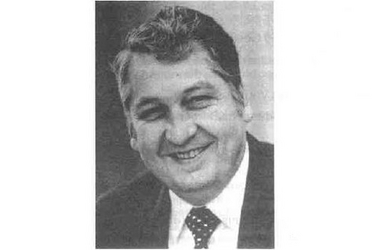
Dr. Mario Ferrari-Brunnenfeld (1932–2001)
Provincial Party Chairman, FPÖ Carinthia from 1975 to 1983
Government Minister, Province of Carinthia, from 1975 to 1983
Secretary of State in the Federal Ministry for Health and the Environment from 1983 to 1987
A senior physician, Mario Ferrari-Brunnenfeld became involved in Carinthian politics in the early 1970s, and as Provincial Party Chairman supported a liberal or national-liberal line within the Carinthian Freedom Party. In the question of bilingual place-name signs in Carinthia, Ferrari-Brunnenfeld was a strong advocate of applying the legislation guaranteeing protection of the rights of ethnic minorities. In the “Small Coalition” between the SPÖ and FPÖ from 1983 to 1987, Ferrari-Brunnenfeld served as a state secretary (junior minister) in the Ministry for Health.
Short biography
Mario Ferrari-Brunnenfeld was born on 23 May 1932 in the Carinthian provincial capital of Klagenfurt as the elder of two sons of a doctor. His ancestors came from South Tyrol. After graduating from high school in Klagenfurt, the Carinthian native went to study medicine in Graz. There, together with Alexander Götz, who was later to become FPÖ federal party chairman, and the future FPO member of the National Council Jörg Kandutsch, he became a co-founder of the Ring of Freedom Party Students (RFS) in Graz. After beginning his medical career in Feldbach in Styria, Mario Ferrari-Brunnenfeld returned to Carinthia in the late 1960s, taking up a position in emergency surgery at the hospital in Klagenfurt.
Mario Ferrari-Brunnenfeld’s career in the FPÖ began in 1970 when he was elected to the party executive of the local FPÖ group in Krumpendorf am Wörthersee as the organisation officer. In 1972 he became the chairman. Following the municipal elections of 1973, Mario Ferrari-Brunnenfeld became a municipal councillor in Krumpendorf am Wörthersee. In the same year, he was also elected to the provincial party executive. Finally, Mario Ferrari-Brunnenfeld became the Freedom Party’s lead candidate at the Carinthian provincial parliamentary elections of 1975, in which the FPÖ suffered slight losses, winning approximately 11.8 percent of the vote and four seats in the provincial parliament. Due to changed constitutional legislation, the FPÖ was also entitled to a position in the provincial government, respectively to the position of fourth provincial government minister. This helped Ferrari-Brunnenfeld to stabilise the party somewhat after the severe losses suffered at the 1970 provincial parliament elections whereupon the parliamentary party nominated Mario Ferrari-Brunnenfeld as the provincial government minister.
In 1975 Mario Ferrari-Brunnenfeld joined the Carinthian provincial government taking on the portfolio for tourism and commerce. During this period Ferrari-Brunnenfeld succeeded, among other things, in increasing the Carinthian tourism budget and raising Carinthia`s profile as a tourist destination with a modern advertising strategy. One result of these measures was an increase in the number of jobs in the Carinthian tourism industry. In 1975 Mario Ferrari-Brunnenfeld was also elected as the provincial party chairman of the FPÖ Carinthia. In this capacity he brought the Upper Austrian Jörg Haider to Carinthia as provincial party secretary of the Carinthian Freedom Party in 1976. In this context, Ferrari-Brunnenfeld is also referred to as “ Haider’s mentor.“ Among the positions Jörg Haider held under Ferrari-Brunnenfeld was propaganda spokesperson of the provincial group in Carinthia. Despite a comprehensive reorganisation of the provincial party and its structures, the FPÖ suffered small losses at the provincial elections in 1979, winning approximately 11.7 percent of the vote.
In 1983 Mario Ferrari-Brunnenfeld – at that time still provincial party leader of the Carinthian Freedom Party – moved to Vienna to join the federal government and in the SPÖ-FPÖ coalition led by SPÖ Federal Chancellor Fred Sinowatz and FPÖ Vice-Chancellor Norbert Steger became a junior minister (state secretary) for health. He held this position until 1987. Mario Ferrari-Brunnenfeld’s place in the Carinthian provincial government was taken over by Jörg Haider, who had become provincial party secretary of the Carinthian Freedom Party in 1976.
After leaving the federal government in 1987 Mario Ferrari-Brunnenfeld did not assume a leadership position within the FPÖ, although in June 1987 he was re-elected as district party chairman by the delegates of the Klagenfurt-Land district. After a conflict with the FPÖ federal party leader Jörg Haider, Mario Ferrari-Brunnenfeld resigned from the FPÖ in February 1989 and withdrew from politics.
In 1992 Mario Ferrari-Brunnenfeld enjoyed a brief comeback on the political stage as a co-founder and later federal chairman of the Free Democratic Party of Austria (FDP). According to Ferrari-Brunnenfeld, the FDP was to be a liberal party with a strong social component. At the time Ferrari-Brunnenfeld described the German FDP as the role model, while at the same time seeking a rapprochement with the Liberal Forum. In 1994 Mario Ferrari-Brunnenfeld resigned from the FDP, ultimately disillusioned by the strained relations with the Liberal Forum. Mario Ferrari-Brunnenfeld died on 28 July 2001 in Klagenfurt aged 70.
